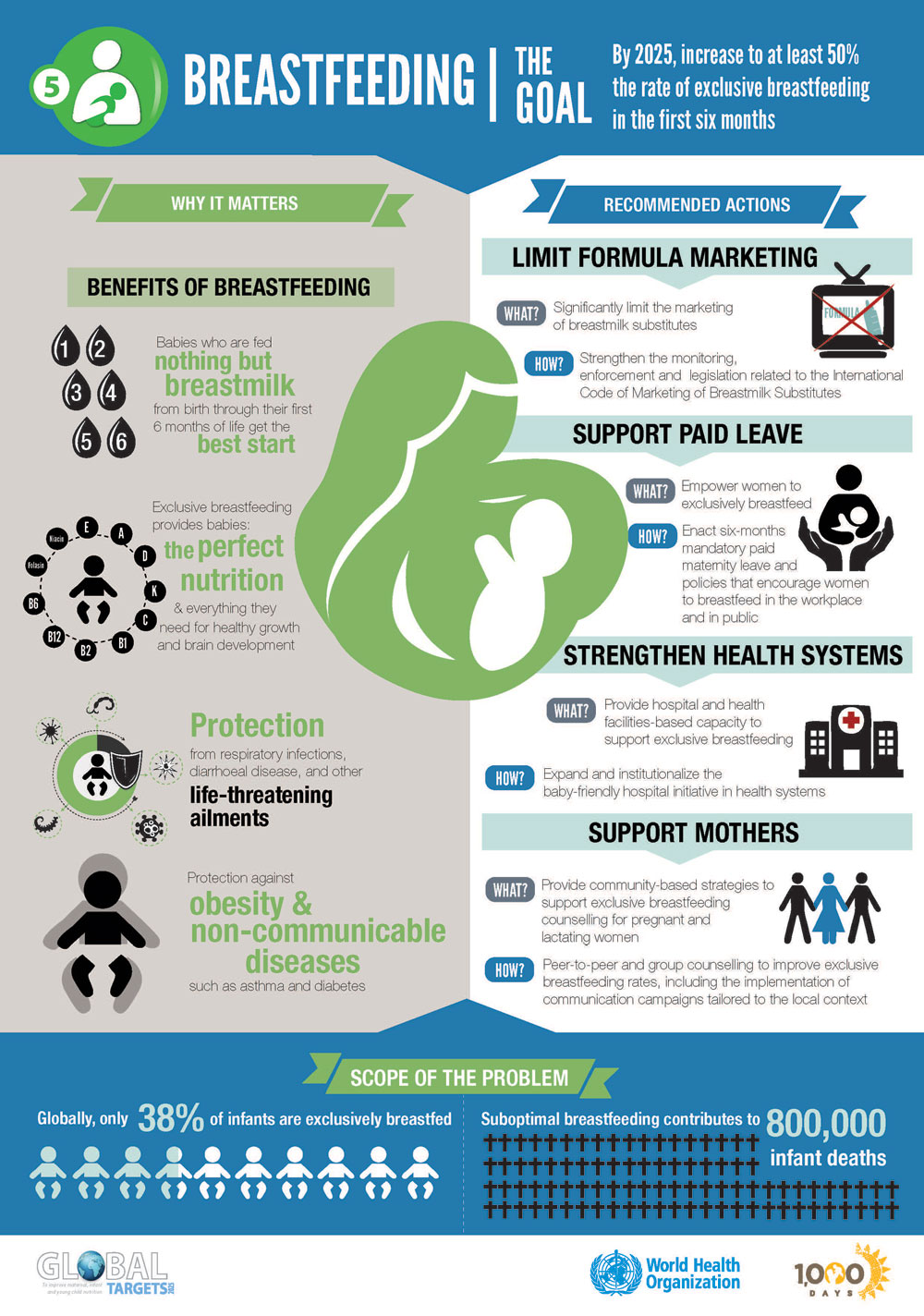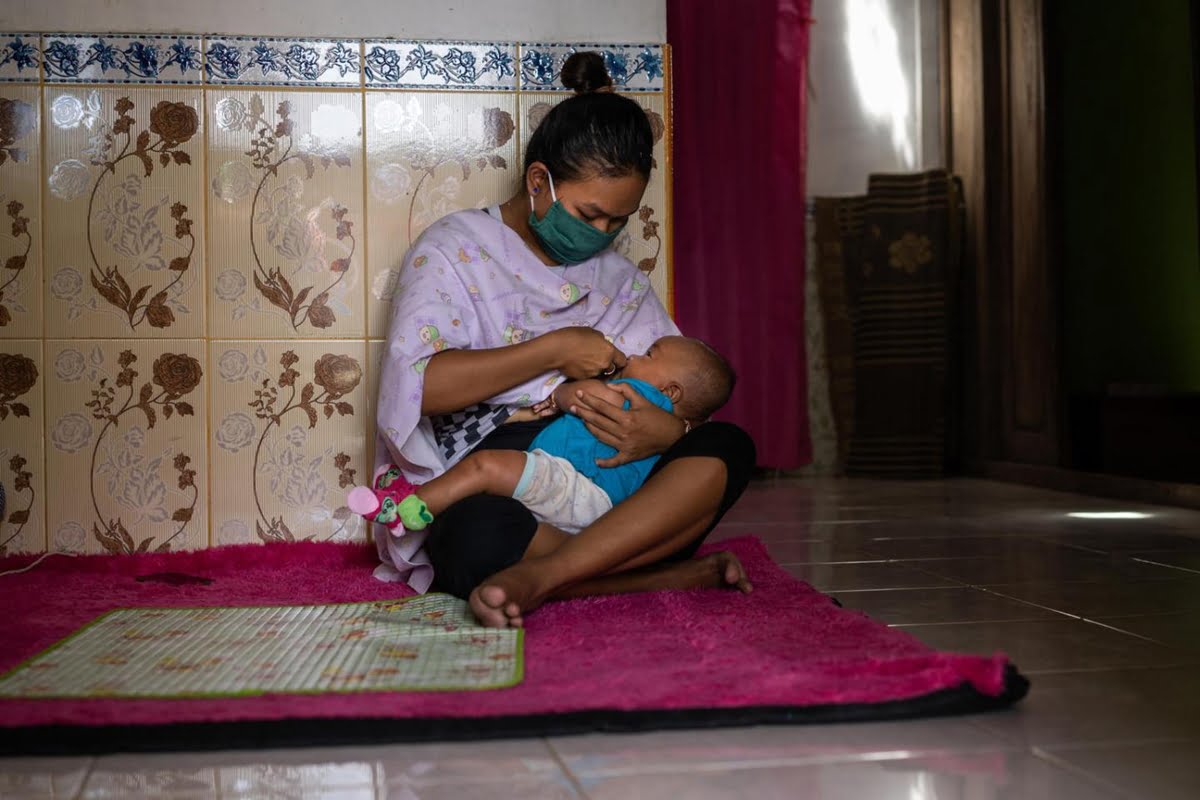The Word Breastfeeding Week (WBW), which was celebrated from 1st to 7th August, leaves us with some very grave concerns. The WBW 2021 reminded us of the correlation between the diminished status of breastfeeding and rising health complications in children and adults globally. The most natural, convenient and spontaneous way of feeding newborns has been progressively neglected over the years and is unfortunately substituted by inferior replacements marketed in the name of complete baby food due to variety of factors.
Despite well-known and proven advantages of breastfeeding, only 41 per cent of infants, under six months of age are exclusively breastfed as per WABA (World Alliance For Breastfeeding Action) report. And only 55 per cent are exclusively breastfed in India. Suboptimal breastfeeding is one of the major contributing factors in infant mortality and morbidity adding to the global burden of disease. The WHO’s advisory on exclusive breastfeeding which is calculated to save lives of 8,20,000 children every year and is economically translated into adding US $302 billion as additional income is indeed instructive.
The WBW prioritises community support for women, conducive and inclusive workspaces along with the healthcare systems to promote and practice breastfeeding in the most practical and sustainable manner. Aligned with as many as 17 United Nations SDGs (Sustainable Development Goals) and the Universal Declaration of Human Rights and the International Convention on the Elimination of all Forms of Discrimination Against Women (CEDAW), breastfeeding is considered as an imperative, holistic and most humane prerequisite in achieving the desired goal of protecting women’s rights and the general well-being of the planet.
Also read: How Does Gender Inequality Contribute To Chronic Malnutrition In India?
This year, the WBW theme of “Protect Breastfeeding: A Shared Responsibility” Emphasises Upon creating awareness and reiterates its forgotten benefits in the least incurred cost, along with recognising breastfeeding as a key to sustainable development.
This year, the WBW theme of “Protect Breastfeeding: A Shared Responsibility” aims to create awareness and reiterate its forgotten benefits in the least incurred cost, along with recognising breastfeeding as a key to sustainable development. Also for the same reasons, the WBW rightly called for regular monitoring of ill-informed advertisements and marketing of the breast milk substitutes through an international code. This code has been mandated by W.H.O. to reign in the harmful commercial enterprises severely jeopardising breastfeeding.

These misleading advertisements often use an image of cherubic baby on its containers, implying its flawed health benefits over irreplaceable breastfeeding. Breastfeeding Promotion Network of India (BPNI) notified in 1995 works in tandem with the International Code of Marketing of Breast Milk Substitutes to monitor and report violations which has significantly led to the decline of breastfeeding.
Breaking Barriers to Breastfeeding
With more women joining labour market and migrating in search of jobs, breastfeeding, which demands and depends on mother and infants to be together, has suffered, and these gaps were immediately filled by the aggressive artificial baby food substitutes, waiting to strike gold. Instead of state-funded solutions for working women to breastfeed and be able to go to work, with growing commercialisation of baby food, breastfeeding begins to be touted as regressive and as an impediment for the newly modern workingwoman. In casting breastfeeding as a restricting activity, which also arguably unfavourably alters their anatomy, many women wilfully opted against it and for many others; the lack of infrastructural support, weak community network and retrograde mindsets brought a death knell to breastfeeding.
Thus, with the WBW 2021 theme of ‘shared responsibility’, we need to organically unify breastfeeding with work in order to create an ecosystem which includes maternity leave and protection laws, mother-friendly workspaces and most importantly, acknowledging breastfeeding as a socially productive work and not just a burdensome private maternal duty, reluctantly excused, if not completely denied.
Ostensibly modern and negative attitudes which were commercially propagated to discredit breastfeeding need to be challenged collectively by actualising breastfeeding as women’s right and control over their body and hence it is pertinent to overcome all the hurdles surrounding it. Concomitant to bodily autonomy, breastfeeding is to be encouraged as empowering and enabling as it promotes good maternal health (with fewer chances of ovarian and breast cancer in mothers who chose to breastfeed) and should also be considered as the mother’s and child’s fundamental right.
The WBW also demands right to reliable medical information, right to consent and informed choice along with primary decision-making in reproduction, infant feeding, privacy and counselling for women. Many women are inadequately informed and thus not in the position to make an intelligent decision about the choice of delivery. While Caesarean operations may be useful and even required in emergency, the growing trend of elective C-section has been found to be directly proportional to the reduced breastfeeding rates. The late initiation of breastfeeding is also attributed to the growing number of Caesarean births, which have been detrimental to the breastfeeding outcome. Women’s autonomy over their bodies in making an educated and conscious choice about birthing and breastfeeding should be systematically integrated with the changing social fabric of rapidly rising and desirable female participation in work force. And for this, instead of blaming women for prioritising career choices and striving to strike a work-life balance, it is important that structures such as family, healthcare and state ensure women are able to manage both.
Facilities for nursing, many women are shamed and criticised for breastfeeding in public because women’s breast are overtly sexualised and the act of feeding and supporting the needs of an infant is marginalised in the process.
The taboo and the social stigma against public breastfeeding also need to be addressed. Due to the lack of adequate facilities for nursing, many women are shamed and criticised for breastfeeding in public because women’s breast are overtly sexualised and the act of feeding and supporting the needs of an infant is marginalised in the process. Many women nursing in public have been reprimanded and hence, discouraged. This social disapproval and moral outrage essentialises women’s breast as sexual organs and sadly fails to recognise that their primary and more pragmatic function is to produce milk.
The discomfort with public breastfeeding arises because of the clash in women’s identities as that of mothers and sexual entities at the same time. The horror of eroticising a mother in a divine role of feeding an infant converts into disgust and repulsion and it is important to note, that to not be able to breastfeed in public restricts the movements of women, which invariably impairs exclusive breastfeeding. As a result of shame, intimidation and insult, many women choose not to breastfeed in public, resorting to formula milk and other substitutes. Hence, part of the awareness of the WBW is to educate people to change their mind-sets.
Also read: Breast Shaming: Society’s Ironic Obsession With Boobs

Tragically, the infant feeding is not determined by best choice in terms of health but by the socio-cultural norms of the society. New Zealand Prime Minister, Jacinda Ardern made headlines when she nursed in public. While the broadcaster later apologised for sensationalising the news, given how nursing in public should be seen as the norm and not the anomaly, Ardern’s act was both personal and political in how she exemplified in naturalising the discussion on breastfeeding in public. Senator Larissa Waters, an Australian MP was also applauded as pictures of her nursing her daughter in the Parliament were shared on the Internet. As a ‘shared responsibility’, we need to encourage, support and facilitate mothers in choosing to breastfeed anywhere and anytime. This requires galvanising community support and incorporating all the sectors and stakeholders to promote and protect breastfeeding.
Amina Hussain is an Assistant Professor at Khwaja Moinuddin Chishti Language University, Lucknow. She writes on gender issues.
Featured image source: unicef.org
About the author(s)
Dr. Amina Hussain is working as an Assistant Professor at Khwaja Moinuddin Language University with the Department of English and Modern European and Asian Languages, Lucknow. She has also taught as an Assistant Professor at Amity University, School of Languages, Lucknow. Recipient of a Medal and Certificate of Merit for securing first position in Sri Venkateswara College, Delhi University in M.A (English Hons). She has also been a UGC-NET-JRF (Junior Research Fellow) with the University of Lucknow, Uttar Pradesh.




